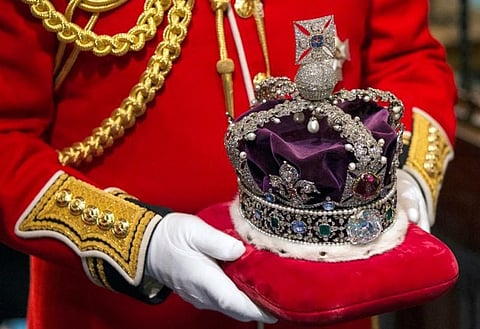
- Home
- NewsGram USA
- India
- न्यूजग्राम
- World
- Politics
- Opinion
- Entertainment
- On Ground
- Culture
- Lifestyle
- Economy
- Sports
- Sp. Coverage
- Misc.
- NewsGram Exclusive
- Jobs / Internships
- Interview

NEW DELHI (Reuters) – India should relinquish its claim to a huge diamond that it has fought for decades to get back from the British, the government told the Supreme Court on Monday, because the stone was given to its former colonial ruler rather than stolen.
One of the world's largest diamonds, the 105-carat Koh-i-Noor has been part of the British crown jewels for 150 years and today forms part of Queen Elizabeth II's crown.
The stone has been at the center of a long-running diplomatic row, with many Indians demanding Britain return the diamond to atone for its colonial past.
But Prime Minister Narendra Modi's government on Monday told India's Supreme Court that it should forgo its claims to the jewel because it was in fact given to the British as a gift by an Indian King, Maharaja Ranjit Singh, in 1851.
Britain's Queen Elizabeth's crown is carried through the Norman Porch of the Palace of Westminster after the State Opening of Parliament on June 4, 2014 in London, England. REUTERS/POOL/Oli Scarff
"It was neither stolen nor forcibly taken away," solicitor general Ranjit Kumar told the Supreme Court during the hearing of a case calling for the stone's return.
The Koh-i-Noor, on display in the Tower of London, is set in the crown worn by the current Queen Elizabeth during her coronation in 1953.
The Duchess of Cambridge, who last week visited India with her husband, Prince William, will wear the crown on official occasions when she becomes queen consort. William is second in line to the British throne.
During a visit to India in 2010, British Prime Minister David Cameron said that the diamond would stay in London.
"What tends to happen with these questions is that if you say yes to one, then you would suddenly find the British Museum empty," he said.
Indian campaigners believe the diamond is one of many artefacts taken from India by the British during colonial rule.
"The British rulers looted India and the government is making a mistake by not supporting our claims," said Nafis Ahmad Siddiqui, who petitioned the Supreme Court for the stone's return.
(Reporting by Suchitra Mohanty, Rupam Jain, Writing by Rupam Jain, Editing by Tommy Wilkes and Nick Macfie)
